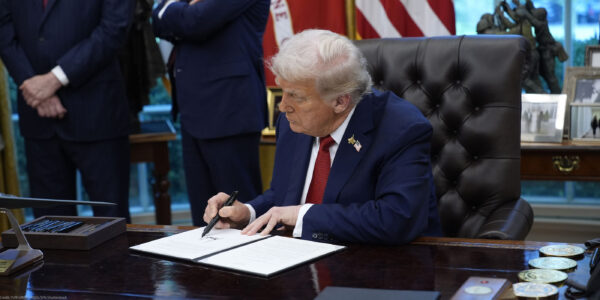The Man Likely to Be the New FBI Director Won’t Commit to Not Spying on Mosques and Muslim Leaders in America


With his nonresponses to congressional questions, Christopher Wray, President Trump’s nominee to be FBI director, made the case for surveillance reform this week.
After his nomination hearing on July 12, Wray was asked to respond in writing to several additional questions from members of Congress regarding how he would respond to pressure to surveil Muslim-American community leaders, mosques, and houses of worship.
These questions should have been softballs. But, shockingly, Wray would not commit to refusing requests for discriminatory surveillance — even in cases where there is no active investigation or suspicion of criminal activity.
Sen. Patrick Leahy of Vermont asked Wray:
During the Presidential campaign, President Trump repeatedly called for surveillance of mosques in the United States.
How would you respond to an instruction from the White House or Justice Department to conduct general surveillance of mosques unrelated to a specific, ongoing investigation, or to conduct assessments or investigations of Muslim-American civil society leaders?
This was Wray's evasive response:
I cannot speculate on a hypothetical question about how I would respond to such a request. As in all matters, I would look at the individualized facts of the situation and follow the law and any policies of the FBI and the Department in determining what the next, appropriate steps might be.
Sen. Christopher Coons of Delaware asked Wray:
Will you commit to instructing the FBI that the agency should not surveil a house of worship unless there is probable cause of criminal activity?
To which Wray responded:
I cannot speculate on a hypothetical question about how I would respond to such a request. As in all matters, I would look at the individualized facts of the situation and follow the law and any policies of the FBI and the Department.
Wray's answer should have been that surveilling individuals on the basis of their faith, without a shred of evidence to suspect they are engaged in criminal activity, is unconstitutional and un-American. Senators should push Wray to clarify his position on these issues before voting on whether to confirm him.
Wray's non-answer is also particularly disturbing given the FBI’s history of improperly surveilling minorities and civil rights activists — a history which Wray explicitly acknowledged during the nomination process.
In the 1960s, under the guise of protecting national security, the FBI surveilled anti-war protesters and civil rights leaders like Martin Luther King, Jr. More recently, the National Security Agency has targeted prominent Muslims in America, including a former Bush administration official who previously held a top secret security clearance and prominent advocates for Muslim rights. The government has also monitored Black Lives Matter protesters, cataloguing the locations of peaceful events, accessing text messages, and even secretly filming demonstrations.
These actions are contrary to our constitutional values, and the ACLU will continue to take action to stop such abuses.
In addition, it is important that we reform surveillance laws, many of which lack adequate protections to guard against abuse. For example, Section 702 of the Foreign Intelligence Surveillance Act, which is set to expire at the end of the year and is currently being debated by Congress, could too easily be co-opted by the Trump administration to further its anti-Muslim agenda or target critics.
Under Section 702, the government collects hundreds of millions of communications every year, including emails and phone calls that Americans have with family members, business associates, or journalists overseas, without a warrant. By evading the Fourth Amendment’s warrant requirement, the government avoids ever having to demonstrate that they are only surveilling people because they have facts to suggest that the individual has done something wrong.
The government justifies this warrantless surveillance by improperly claiming it is necessary to protect national security. The government disingenuously claims that it is only “targeting” foreigners, despite the fact that they fully intend to capture Americans’ international communications.
The falsity of these arguments is even more apparent when we look at how Section 702 information is used. The FBI routinely searches through information collected under Section 702 for information about people in the United States, without a warrant and for purposes that have nothing to do with national security. There is little that prevents Section 702 from being used to support fishing expeditions by the government that improperly target journalists, activists, or religious groups — all in violation of the Fourth Amendment.
That means that if President Trump or someone in his administration disregards our rights under the First and Fourth Amendments and the Equal Protection Clause and decides to target mosques, community leaders, or political groups by claiming a “foreign intelligence” purpose, existing policies would not prevent the FBI from searching through 702 databases for the emails or phone calls of associated individuals. From his responses, Wray has made one thing clear — he will not commit to preventing this type of unconstitutional and intrusive surveillance. Indeed, we cannot even be confident that a Wray-led FBI will not use other means to target individuals on the basis of their religion or political opinions.
But this can be changed and stopped. Congress can step in. The first step is to reform Section 702 to require warrants before searching through the Section 702 database for information about Americans and people living in the U.S. Then Congress must undertake a more substantial reform of government surveillance powers to prevent abuse, discrimination, and chilling of free speech under the Trump administration and beyond.
More information on additional reforms to Section 702 are available here.


